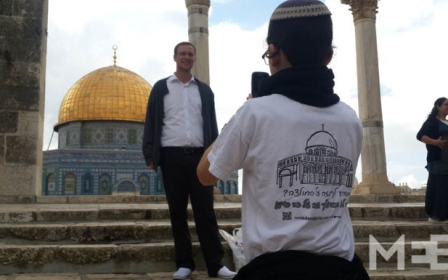Tensions high in Israel and West Bank after Palestinian youth killed

Tensions remained high in Israel and the West Bank on Saturday after Palestinian citizens of Israel staged protests following the shooting dead of a Palestinian youth and activists broke through the separation wall.
The protests erupted in northern Israel, with dozens of young people reportedly taking to the streets and burning tires. A further march has been called for Saturday afternoon, and local authorities are urging people to hold a two-day strike in response to the killing, which occurred overnight.
Israeli police shot dead a 22-year-old youth in the Palestinian village of Kafr Kana after he allegedly threatened police officers with a knife. The police claim that they fired warning shots into the air before shooting the youth in the chest. However, CCTV footage from the scene seems to indicate that the police were never in immediate danger, were inside their vehicle at the time of the attack, and did not fire a warning shot.
The local Kafr Kanna council said in a statement that the youth had been killed in "cold blood".
Council chairman Mujahed Awawdeh told Anadolu Agency: "There is a state of anger following the youth's death. We have called a two-day strike in the town [to protest over the killing]."
A Ministry of Justice investigation into the incident has been launched, Northern District commander Major General Zohar Dvir said. He also said the police presence in Kafr Kana would be strengthened.
Palestinian citizens of Israel, referred to by Israel as "Arab Israelis", are Palestinians who were not driven out during the 1948 war and were later given Israeli citizenship. They make up around 20 percent of Israel’s eight million population.
Seperation barrier
Protests also took place near the West Bank town of Bir Nabala, where activists broke through the separation barrier that cordons off much of the West Bank from Israel and occupied East Jerusalem.
"On a day like today, the Berlin wall came down," a masked activist, who helped break down the wall, told Anadolu Agency. "This hole is only the beginning of ending the apartheid wall that cuts Palestinian lands."
Sunday will mark 25 years since the wall dividing East and West Berlin started to be torn down, reuniting the city after almost 30 years.
"The separation barrier exemplifies apartheid in modern times. We will continue with our activities against the expansion of settlements and the construction of the barrier until it is removed," the activist said.
The Kafr Kana shooting and wall demolition both after yet another day of clashes in East Jerusalem in a so-called "day of rage" that pitted youths throwing stones and firecrackers against police, who used rubber bullets, stun grenades and tear gas.
The violence was particularly intense at the Shuafat refugee camp, a maze of alleys crammed with Palestinian homes along the separation barrier.
The spike in violence came after one of the camp's residents drove a car into pedestrians in Jerusalem on Wednesday, killing a policeman and injuring nine people before he was shot dead.
On Friday, a young Israeli also died of injuries sustained in the attack. The incident followed a similar attack two weeks ago, as well as a shooting of a right-wing Israeli activist, Yehuda Glick. His alleged Palestinian assailant was later shot dead by Israeli security services.
The Israeli police have vowed to crack down on unrest and restore security Jerusalem.
"After the two serious terrorist attacks that took place in Jerusalem, as far as we are concerned ... we have to heighten security in terms of our intelligence," Miki Ruzenfeld a police spokesperson told MEE. "We have to make sure we get to those terrorists before they get to the streets."
The international community has repeatedly called for calm. Speaking on her first official visit to Jerusalem on Friday, the European Union's new foreign affairs chief, Federica Mogherini, who took over the post on November 1, said there was a real "urgency" to pick up and advance the moribund peace process.
"The risk is that if we do not move forward on the political track, we will go back again to violence," she told reporters. She also flagged up Israel's settlement building on lands the Palestinians want for a future state as an "obstacle" to a negotiated peace.
Shortly afterwards, Mogherini met Israeli Prime Minister Benjamin Netanyahu, who gave a terse statement dismissing all criticism of his settlement policy.
"I reject the fictitious claim that the root of the continuous conflict is this or that settlement," he said. "Jerusalem is our capital. and as such is not a settlement."
Mogherini continued her visit to the region on Saturday, holding a press conference in Gaza and calling for the establishment of a Palestinian state based around Israel's 1967 borders.
"We need a Palestinian state - that is the ultimate goal and this is the position of all the European Union," she said.
Stay informed with MEE's newsletters
Sign up to get the latest alerts, insights and analysis, starting with Turkey Unpacked
Middle East Eye delivers independent and unrivalled coverage and analysis of the Middle East, North Africa and beyond. To learn more about republishing this content and the associated fees, please fill out this form. More about MEE can be found here.






